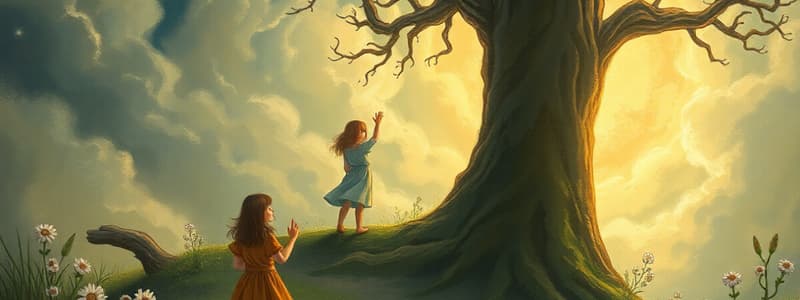Podcast
Questions and Answers
What does Experience represent in Blake's Songs?
What does Experience represent in Blake's Songs?
- A celebration of childhood innocence
- An idealistic view of the past
- A pessimistic view of the present and future (correct)
- A hopeful outlook on the future
Which pair of poems exemplifies the contrasting themes found in Blake's Songs?
Which pair of poems exemplifies the contrasting themes found in Blake's Songs?
- The Tyger and The Lion
- The Lamb and The Tyger (correct)
- The Lamb and The Ass
- Chimney Sweep and The Garden
What is the overall significance of Blake's Songs?
What is the overall significance of Blake's Songs?
- They provide entertainment and joy
- They transcend their historical context to critique societal issues (correct)
- They only address the beauty of nature
- They focus solely on personal feelings
What literary device does Blake use to convey his critiques in his poems?
What literary device does Blake use to convey his critiques in his poems?
How do the contrasting themes in Blake's Songs illustrate societal issues?
How do the contrasting themes in Blake's Songs illustrate societal issues?
What aspect of children's experiences does Songs of Innocence primarily critique?
What aspect of children's experiences does Songs of Innocence primarily critique?
Which of the following themes is NOT associated with Songs of Experience?
Which of the following themes is NOT associated with Songs of Experience?
What is the tone of the poetry found in Songs of Experience?
What is the tone of the poetry found in Songs of Experience?
Which poem exemplifies a critique of societal structures in Songs of Experience?
Which poem exemplifies a critique of societal structures in Songs of Experience?
How does Blake's Songs of Innocence contrast with Songs of Experience in its portrayal of nature?
How does Blake's Songs of Innocence contrast with Songs of Experience in its portrayal of nature?
What critique does Blake offer regarding the Church in Songs of Experience?
What critique does Blake offer regarding the Church in Songs of Experience?
What common theme runs through both Songs of Innocence and Songs of Experience?
What common theme runs through both Songs of Innocence and Songs of Experience?
Which imagery is primarily used in Songs of Innocence?
Which imagery is primarily used in Songs of Innocence?
Flashcards
Blake's Songs critique
Blake's Songs critique
Blake's work in Songs exposes societal problems, going beyond its time period, as it examines human nature and struggles with beauty and suffering.
Innocence vs. Experience
Innocence vs. Experience
Blake's poems showcase contrasting views: innocence as a perfect past, and experience as a pessimistic present/future, offering parallels and contrasting topics like "The Lamb" and "The Tyger".
Songs of Innocence
Songs of Innocence
A collection of poems by William Blake exploring the ideal of childhood purity, imagination, and connection to nature.
Songs of Experience
Songs of Experience
Signup and view all the flashcards
Symbolic Language
Symbolic Language
Signup and view all the flashcards
Parallelism in Songs
Parallelism in Songs
Signup and view all the flashcards
Innocence theme
Innocence theme
Signup and view all the flashcards
Timeless Commentary
Timeless Commentary
Signup and view all the flashcards
Experience theme
Experience theme
Signup and view all the flashcards
Social critique
Social critique
Signup and view all the flashcards
Child Labor
Child Labor
Signup and view all the flashcards
Contrasting themes
Contrasting themes
Signup and view all the flashcards
Utopian view
Utopian view
Signup and view all the flashcards
Study Notes
Introduction
- William Blake's Songs of Innocence and of Experience is a collection of poems exploring contrasting views of childhood and human nature.
- The poems offer a social critique of the prevailing societal norms of Blake's time, particularly the hypocrisy and injustices.
- Innocence explores the ideal of childhood purity and imagination with a utopian outlook.
- Experience contrasts innocence with the harsh realities of societal pressures, societal inequalities (e.g., poverty, oppression, war), and hypocrisy affecting adults.
Songs of Innocence
- Themes:
- Childhood innocence, imagination, and simplicity
- Spiritual purity and connection to nature
- Optimism and a utopian view of existence
- Style:
- Often simple, lyrical, and melodic language
- Evokes a childlike naivete and joy
- Use of imagery that evokes warmth, connection and nature
- Example Poems:
- "The Lamb" (focus on innocence and spirituality)
- "The Chimney Sweeper" (depicts child labor and cruelty)
- Social Critique in Innocence:
- Implicit critiques of child labor and social inequality through the imagery of the poems, though not explicitly stated.
Songs of Experience
- Themes:
- Adult disillusionment and hypocrisy
- Social injustice and oppression
- The corrupting influence of society and the loss of innocence
- Style:
- More complex and sophisticated than Innocence
- Often darker and more cynical tone
- Use of imagery and symbolism that critiques the prevailing societal norms
- Example Poems:
- "The Tyger" (questioning the power of creation and the existence of evil)
- "The Sick Rose" (taunting the corrupt nature of love and relationships by emphasizing the corrupting nature of the rose)
- "London" (depicts the suffering and degradation of London's poor and those abandoned by their society)
- Social Critique in Experience:
- Explicit critiques of societal evils
- Depiction of poverty, exploitation, and injustice
- Shows the consequences of societal pressures on the individual
- Explicit critique of the Church, and the "Holy men" who exploit the poor and helpless.
Contrasting Themes and Style
- Contrast:
- The contrasting nature of Innocence and Experience aims to show societal pressure to conform and grow out of innocence, leaving one disillusioned.
- Innocence is a utopian vision of the past, but Experience is a pessimistic view of the present and the future.
- Parallelism:
- Many poems in the two sections have counterparts that comment on and contrast each other, highlighting the differences between ideal and reality e.g. "The Lamb" and "The Tyger".
- Symbolic Language:
- Blake uses symbolic language across the two collections to convey his critiques. e.g., the Chimney Sweep.
Overall Significance
- Blake's Songs presents a profound social critique that transcends its historical context.
- The poems offer timeless commentary on the complexities of human nature and the challenges of navigating a world filled with both beauty and suffering.
- The use of contrasting themes and styles helps emphasize the need for societal reform and to highlight the need for acknowledging injustice.
- Blake uses the contrasting nature of the poems to highlight both the beauty and the danger of a world where innocence is lost to societal pressure.
Studying That Suits You
Use AI to generate personalized quizzes and flashcards to suit your learning preferences.




